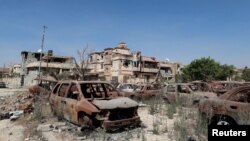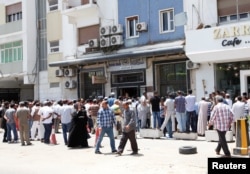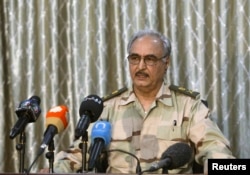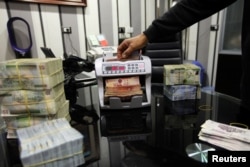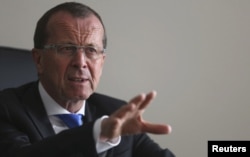Militias backing the U.N.-negotiated unity government in Libya are making progress on the battlefield against Islamic State militants, but the Government of National Accord is making little progress in establishing its authority in Libya's east.
And in the west of the country, and in the Libyan capital, Tripoli, frustration is building, with disappointed residents saying the GNA has done little to improve their lives. The cost of food has sky-rocketed, power cuts are frequent and a liquidity crisis has not been solved, resulting in salary payments being delayed for months and banks having to restrict how much cash Libyans can withdraw.
As as many as 1.3 million of Libya's 6.3 million people need humanitarian assistance, according to the United Nations.
The U.N. special envoy to Libya, Martin Kobler, underlined Monday the urgency of the need for a functioning government in the fractious, chaotic country, hinting that time is running out for the GNA and that the basic needs of the Libyan people need to be met quickly.
Briefing the U.N. Security Council, he highlighted the “considerable progress over the last days and weeks in the fight” against the Islamic State’s affiliate in Libya, but underlined the implementation of the Libyan Political Agreement “has stalled, and it has stalled because some parties to the agreement have failed to uphold their commitments.”
There are few signs that those commitments will be upheld any time soon, dashing the hopes of Western officials.
A key obstacle rests with one of the two rival governments the GNA is meant to replace. The National Salvation Government’s legislature, the House of Representatives, still has failed to vote to endorse the GNA, as required under the six-month-old U.N.-mediated deal creating the unity government.
The GNA was meant to be a first step in bringing order to a country that has known little since Moammar Gadhafi’s 2011 ouster. Western officials have placed hope in war fatigue, the allure of foreign aid and development money, and the growing threat of IS to build popular momentum for the unity government.
Legitimacy of GNA
But in large parts of Libya, questions remain about the GNA’s legitimacy. None more so than in the east where onetime Gadhafi-era general Khalifa Haftar, a warlord with political ambitions to become a Libyan version of Egypt’s strongman, General Abdel el-Sisi, refuses to back the unity government.
Tarek Megerisi, a political analyst with the Sadeq Institute, a Libyan organization, said Libya’s unity government can survive only by finding a way to stand up to General Haftar.
“Libya’s ostensible friends in the international community overlooked one big obstacle: General Khalifa Haftar and his motley band of Gadhafi-era soldiers and militias known as the Libyan National Army [LNA],” Megerisi argued in an article this week for Foreign Policy magazine. Unless Haftar’s opposition is overcome, Libya could be heading into “an even broader conflict, one that might even ultimately lead to partition,” he warned darkly.
Also in the east, politicians with the National Salvation Government appear to be doing everything they can to undermine the GNA and to prevent if from building a national force not reliant on the whims of western militias.
This week the rival government ordered the disbanding of a Specialized Anti-Terrorist Force, a Benghazi militia that was once loyal to Haftar but declared its support for the GNA last Saturday. Observers see the move as a bid to eliminate support for the GNA defense minister, Mahdi Barghathi.
Currency issue
The eastern politicians say they don’t trust Libya’s Central Bank in Tripoli to distribute fairly across the country $738 million being printed in Britain. More than 100 million of those bank notes have been delivered, but the National Salvation Government has Russian-printed bank notes it says it ordered because Tripoli has been holding back half of what it should have made in payments to the east in the past few months.
The GNA-loyal Central Bank in Tripoli has warned the distribution of Russian-printed notes could lead to greater political division and trigger a collapse of the already weakening currency. U.S. diplomats say the east’s Russian-printed notes “could undermine confidence" in Libya's currency.
To try to jump-start the GNA, the European Commission announced Tuesday $6.6 million in aid to support stabilization efforts and to help repair critical infrastructure in conflict-affected areas.
“In turn, this will enable the reopening of key services at municipal level, underpinning the country's efforts to stabilize the overall political situation in Libya and to allow business activity to recover,” the commission said.
Building political unity
Updating the United Nations on his efforts to build political unity in Libya, envoy Kobler warned there is a danger of rival government forces turning on one another. “Libyans must not fight each other, but unite against the common enemy,” he said, referring to IS.
In a move to try to help the GNA forge unity among the disparate armed groups in the country, Britain is circulating a draft U.N. resolution that would authorize EU naval forces to intercept ships suspected of smuggling arms into Libya.
The objective would be to stop weapons getting to IS or Haftar’s forces, allowing the partial lifting of a U.N. arms embargo so GNA forces could receive selected arms from Western powers, providing an incentive for militias to back the unity government, if they want resupplies.




